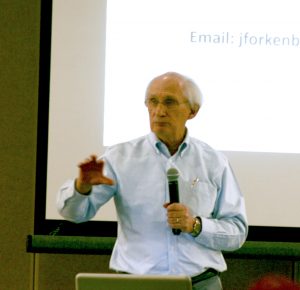LNI Education Conference
 RAPID CITY – John Forkenbrock, a nationally recognized scholar of federally funded education, gave a talk on December 19 at the 41st Lakota Nation Education Conference. The conference took place from December 16 – 19, 2019 at the Ramkota convention center and Forkenbroch’s talk was about the history of funding for Native American education in the United States.
RAPID CITY – John Forkenbrock, a nationally recognized scholar of federally funded education, gave a talk on December 19 at the 41st Lakota Nation Education Conference. The conference took place from December 16 – 19, 2019 at the Ramkota convention center and Forkenbroch’s talk was about the history of funding for Native American education in the United States.
Recognized extensively by Forkenbroch was the little lee-way that Native American schools receive by an overshadowing of bureaucracy from the Federal government. By the end of his history on Native rights, citizenship, designations, and funding, Forkenbrock proposed what he dubbed as his “thinking outside the box” solution to historically and contemporary inadequate funding for Native American education. He proposed that the Bureau of Indian Education (BIE) should be controlled by a Native American member board that sets the budget, and not the Interior Department. Therefore the BIE would set its budget on what it believes that it needs, that it would direct assessment of curriculum, hiring, and policy formation. He said “Educators would be running the school systems while being fully independent”
“I know this is rough around the edges and a little radical, but I don’t think that thinking outside the box is a bad thing” he said “If there remains a bureaucracy that overshadows good intent, then maybe it’s time to think outside the box. What do we have to lose?”
He pointed out numbers such as 24 years between the Snyder Act (declaring Native Americans as full citizens) to Native Americans acquiring full voting rights in 1948. Seventy-six years from the Snyder Act until the BIE could finally submit its own budget to congress. He raised the question of “if Indians are full-blown citizens, why can they not vote and why (acquired even later) can the BIE not submit its own budget?”
In 1958 children from Indian lands could attend public schools but they were classified as “category (b)”, meaning that the amount of federally designated funds for Native American students was only 20% of students classified as “category (a)”. Forkenbroch said “If a military child was getting $1.00 in 1958, then the Indian child was getting $0.20” Children from Indian lands acquired “category (a)” classification 12 years later in 1970.
Forkenbroch spoke about funding proponents for Native American education such as Patty Murray, Democrat senator from Washington state, and Tom Cole, Republican representative from Oklahoma, who told Forkenbroch “As long as I am in office I will see to it personally that there is funding for Native American education”
The proposed Trump 2020 budget for the 12 sub committees which impact the funding of Native American education is $576 billion, which is lower than 2019. But that amount is above the agreed upon deal in 2011 which guaranteed these sub committees an amount in the mid $500 billion range. In recent years the budget for these committees has exceeded $650 billion.
John Forkenbrock is the Executive Director of the National Association of Federally Impacted Schools (NAFIS). The NAFIS is a lobbying and advocacy group which is currently working on projects such as access to high-speed broadband on Native American Reservations. “There is usually only one broadband provider in tribal areas which results in quality of product being driven down, and price of product being driven up” he said.
The Lakota Nation Education Conference is only a couple years younger than the Lakota Nation Invitational. The conference was hosted by the Stronghold Education Development LLC in the Ramkota event center and featured many panels, speakers, and open forums. SED Vice President Terri Jo Gibbons and SED President Maurice Twiss are the principle organizers of the annual event. With over 400 attendants from all over the country, the Lakota Nation Education Conference is a paramount display of factors that impact education in Indian Country.
(Contact Travis Dewes at travisldewes@gmail.com)
